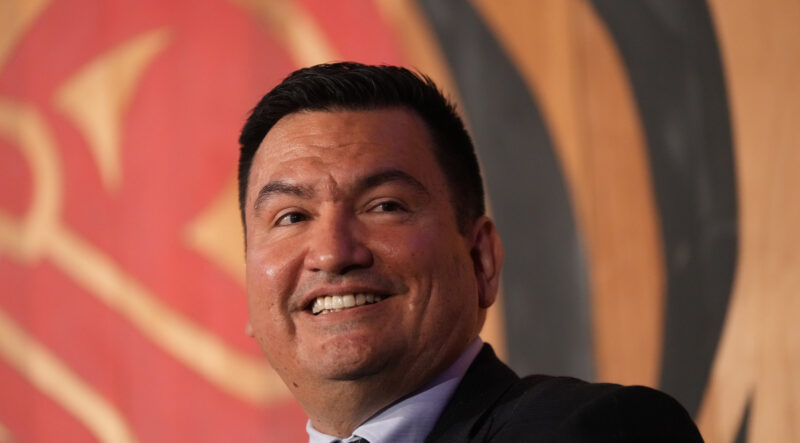Aquaculture: First Nations push for collaboration over conflict
First Nations summit aims to move decades-old aquaculture conflict to a new place of collaboration led by Indigenous seafood partnerships.
By Fabian Dawson
SeaWestNews
The Federal government should not make any decisions on open-net salmon farming in British Columbia without having an extensive understanding of the potential devastation to rural and remote communities in the province, states a coalition of First Nations.
The Coalition of First Nations for Finfish Stewardship (FNFFS) said it is deeply opposed to the Federal Government disregarding science and bowing to unfounded activists’ claims while discussing plans that could remove salmon farms from these Nations’ territories.
Members of the Coalition said they are united by a concern that the Minister of Oceans, Fisheries and Canadian Coast Guard, Joyce Murray, is:
- Rushing the ongoing open net-pen Transition Plan engagement process for finfish aquaculture in British Columbia, and is
- Attempting to make possibly damaging decisions for our Indigenous communities without conducting proper due diligence like socio-economic impact studies.
“Ottawa must fully understand all and any potential impacts their decisions can have, including what is feasible and what isn’t, for each Indigenous community hosting salmon farms. And we reiterate that those social and economic impact analyses must be completed prior to any transition plan decision being made by the federal government,” the Coalition said in a Twitter post.
Currently, 17 First Nations have a variety of agreements and business arrangements with finfish aquaculture companies in BC with the longest going back over two decades. These 17 Nations make up much of the south coast of British Columbia, with supply lines in the Fraser Valley, processing plants on the Lower Mainland, and transport contracts across the province.
The concerns over the economic fallout from the salmon farm closures, which will impact more than 4,700 jobs and $1.2 billion in economic activity annually, was a common theme in the recently released ‘What We Heard’ report from Fisheries and Oceans Canada (DFO).
The coalition has also said transitioning to land-based salmon farming is not an option for aquaculture-dependent coastal indigenous communities in British Columbia.
Coalition leaders and aquaculture industry experts will be speaking to the devastating impacts several remote communities face should their salmon farms be shut down at the upcoming 2023 Indigenous Partnerships Success Showcase (IPSS), which runs June 1 and 2 at the Vancouver Convention Centre.
As part of the showcase, the FNFSS will feature in a discussion entitled, “Charting a Path to Sustainable Indigenous-led Seafood Partnerships.”
It’s a discussion that aims to navigate through stormy waters to a future that’s mutually beneficial to First Nations and all Canadians, said the organisers.
The speakers will include Dallas Smith (Na̲nwak̲olas Council), Chief Chris Roberts (We Wai Kum First Nation), Councillor Isaiah Robinson (Kitasoo / Xai’xais Nation) and Dave Stover from Brown’s Bay Packing.
“There’s an industry that’s going to be moving forward in some form and I believe there’s a lot of interest both from industry and First Nations to look at how we can start fresh from a place of collaboration,” said Squamish Nation hereditary Chief and IPSS chair, Ian Campbell.
Top-of-mind during that session will be the federal government’s recent decision to not renew licences for 15 open-net Atlantic salmon farms around British Columbia’s Discovery Islands.
“That was a controversial decision,” Campbell said. “There were Indigenous people who were for and against that decision and it was one that was largely made by the federal government with very little consultation with local communities. Out of that came a lot of frustration, but we’re also seeing a lot of activity and ideas about the path forward.”
Beyond this panel discussion, IPSS 2023 will include dozens of speakers and cultural performers, with keynote speeches and panel discussions.
Speakers will address a mix of urban and rural topics including salmon farming, mining, environmental stewardship, youth leadership, urban development, export and trade, capitalizing Indigenous business, healthcare, Treaty 8, the digital economy and more.
Tickets for the 2023 Indigenous Partnerships Success Showcase are available here.
While the opportunity to sustainably produce more salmon in Canada is unparalleled in the world the Liberal government has been unduly influenced by aquaculture detractors and activists rather than relying on science and traditional indigenous knowledge to grow the industry, states the Canadian Aquaculture Industry Alliance (CAIA).
There are now several legal challenges mounted by First Nations, aquaculture service and supply companies and salmon farmers over two ministerial decisions to shut down fish farms in British Columbia’s Discovery Islands.
Current Fisheries Minister Joyce Murray and her officials are also working on implementing an open-net pen transition plan for all of BC, expected to be finalized soon.
(Image shows Squamish Nation hereditary Chief and IPSS chair, Ian Campbell.)

